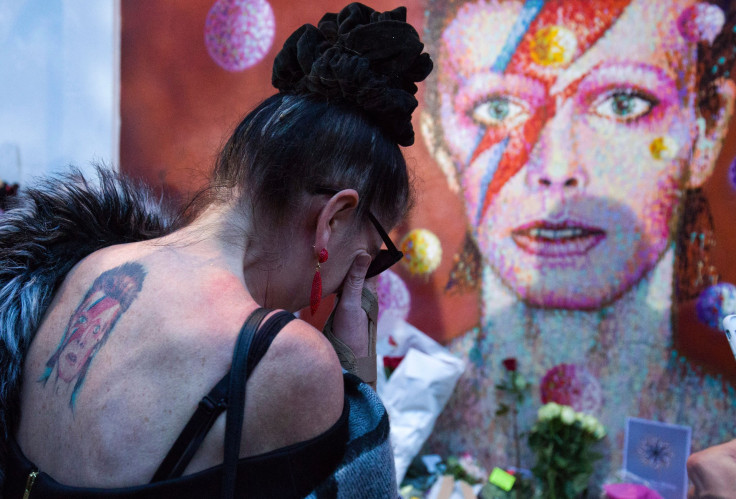Why The Most Important David Bowie Tributes Are Streaming On Spotify, Apple Music And Tidal

Tributes to iconic musician David Bowie flooded every corner of the media world Monday, but to the bean counters at the major labels, the most important ones will be those crafted by streaming music services. Over the past decade, services like Spotify, Apple Music and others have become instrumental in how we look back at artists who have just died, and they reliably drive huge surges in listening that can push albums back onto the charts one last time.
“Being able to stream an artist's music instantly has majorly changed the way we mourn,” said Zena Burns, the principal at media and entertainment consultancy Moxie Coalition and a former executive at iHeartRadio.
News broke on Monday that Bowie succumbed to cancer at the age of 69. His final album, "Blackstar," had leapt to the top of the U.S. album sales chart over the weekend, and it's likely he would have wound up on top without any help. Indeed, a Bowie-hits album reached No. 2 on the iTunes album charts by Monday morning. A Spotify spokesperson confirmed that streams of Bowie's music had leapt 2,700 percent that day. To put that in perspective, that increase is exponentially larger than the 676 percent increase Missy Elliott enjoyed after her surprise, scene-stealing performance during Super Bowl XLIX's halftime show.
The right Spotify playlist or peak-time block on Beats 1 could wind up shooting Major Tom into the stratosphere, a one-time opportunity that Bowie's labels can't afford to miss. “I hate to say it, but it's an opportunity to sell records, too,” said Lisette Paulson, an artist and label relations consultant who previously worked at Tidal.
Once upon a time, the best a record label could hope for when an artist passed or a major album anniversary arrived was for fans to get caught up in tributes on the radio or in magazines and maybe go buy something. Today, now that people can reconnect with old favorites or belatedly begin exploring an artist’s discography with just a couple clicks, that dynamic has been fundamentally altered.
“Accessibility plays a huge role,” said Jim Lidestri, the founder of BuzzAngle Music. “In the old days, would you have driven to the store and bought a Bowie album?”
Labels understood that on-demand services like Spotify could play this role the minute they appeared. But as streaming has scaled, what began as a way to tend embers of enthusiasm has become a way to stoke enormous surges in popularity. This past May, streams of B.B. King’s music increased 9,800 percent the week after the legendary guitarist died. That, along with a strong week of sales on iTunes, was enough to put three of King’s albums back on the Billboard charts, and to virtually blanket Billboard’s Blues Digital Songs chart for a week — all of a sudden, 18 of the tally’s 25 songs were King’s.
For the major labels, which still earn a healthy majority of their income from the sales and streams of older, or catalog material, this is a welcome tipping point.
Stream of Consciousness
It’s also a happy moment for the streaming services themselves, which are always on the hunt for a way to super-serve existing listeners and, potentially, entice new ones. “It's sort of the most creative way to highlight the catalog,” Paulson said.
Each is using methods that will best speak to its core listeners. Spotify published a 49-song playlist within hours of the news becoming public. Zane Lowe, the head of Apple’s global radio station Beats 1, began his set Monday with “Blackstar,” the title track off Bowie’s final album, then launched into a personal batch of Bowie classics he remembered discovering in his brother's record collection.
How each service decides to pay tribute will be informed by who its target audience is. “I think services that aim at a younger audience are going to get great response to their editorial [efforts],” said Joe Armenia, the former head of artist-label relations at Rdio.
Armenia noted that most of Rdio’s core listeners, men in their 30s who consumed music voraciously, would be able to make a beeline for the Bowie album or song that meant the most to them. Millennial listeners coveted by other services, by comparison, who might know Bowie as someone their parents listened to, would more likely appreciate tributes that double as introductions.
In every sense and every way, however, the point was to participate. “You want to be part of the conversation,” Armenia said.
This story has been updated to include streaming stats provided by Spotify.
© Copyright IBTimes 2024. All rights reserved.











